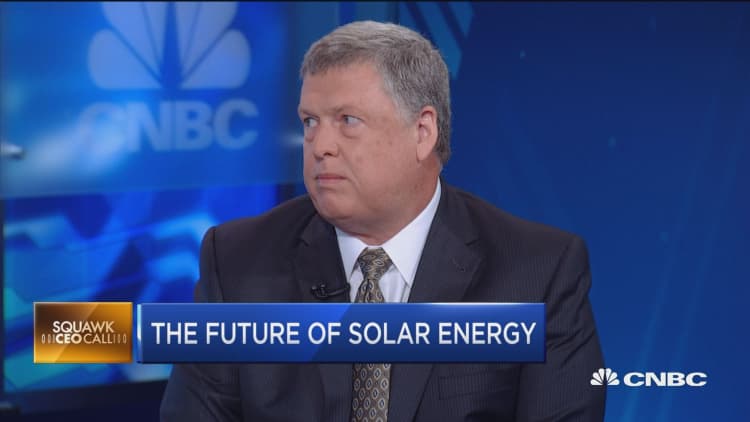Some of the world's top oil exporters want to be major players in solar power, too.
Middle East and North African countries, blessed by ample sunlight and open space, are increasingly adopting solar power. But it's not European, Chinese or American companies taking the lead on some of the region's largest solar parks. It's local firms that are relatively new to renewable energy.
Analysts say meeting solar demand at home is just the start. Some of these companies could become global competitors in the fast-growing market for large solar power plants.
"There's going to be more projects throughout the Middle East, and we certainly see these guys as some of the market leaders in the future," said Moritz Borgmann, a partner at Apricum, a strategy advisory firm specializing in renewable energy.
The price is right
Regional companies have attracted attention by setting solar costs at record lows.
A group led by Saudi Arabia's ACWA Power International put in the then-lowest-ever bid of 5.85 cents per kilowatt hour in January 2015 in winning a contract to build part of a huge solar plant plant for the Dubai Electricity and Water Authority.
Abu Dhabi-based renewable energy company Masdar and Saudi Arabia's Abdul Latif Jameel shattered that record in May when they offered to operate 800 megawatts of solar energy at 2.99 cents a kilowatt hour for another phase of the same Dubai plant.
No one would have thought a few years ago to tender an 800-megawatt project like they did in Dubai, and so it's really created a new environment where these countries can actually benefit from being a bit late to the game.Josefin BergIHS senior solar power analyst
Analysts warn that those ultra-low prices won't likely set a new global standard. The economics are somewhat unique to massive Middle East projects and are not feasible elsewhere.
Companies like Masdar and ACWA can submit the super low bids in part because they have access to low-cost capital from regional banks and sovereign wealth funds.
Middle East firms are trying to grab market share and establish a track record for building solar projects in the region, said Josefin Berg, senior solar power analyst at IHS.
They are also entering the market at an opportune time. The cost of providing utility-scale solar power has plummeted in recent years. In the United States, it fell about 60 percent from the 2007-2009 period to 2015.
"No one would have thought a few years ago to tender an 800-megawatt project like they did in Dubai, and so it's really created a new environment where these countries can actually benefit from being a bit late to the game," Berg said.
Local advantage
The Middle East firms have another valuable advantage: on-the-ground experience developing energy and electricity projects, said Dan Reicher, executive director of the Steyer-Taylor Center for Energy Policy and Finance at Stanford University.
Local companies understand the local electricity grid, regulations and incentive structures, he explained.
ACWA was already operating conventional power projects around the region when it pushed into the solar generation space a few years ago. Masdar was established in 2006 by the Abu Dhabi government-owned Mubadala Development Company, which operates utilities on the Arabian peninsula and in Algeria.

There are differences in operating and deploying big solar power projects, but it's relatively straight-forward technology, and there is a lot of overlap with running conventional plants, Reicher said.
"I wouldn't sit here and suggest that there are huge areas of expertise that an EPC doing work in Europe or North America would necessarily have over a company in the Middle East," he said, using an acronym for engineering, procurement and construction management firms.
Many of the projects are actually joint ventures with foreign firms with expertise in the field of solar deployment, said Justin Dargin, an expert on Middle East energy and former research fellow at Harvard's Dubai Initiative.
For the Dubai project, ACWA is working with Spanish engineering and construction company TSK and using solar modules created by U.S.-based First Solar.
This collaboration is mutually beneficial, Dargin said. The Middle Eastern companies further develop their capabilities while working alongside foreigners, and the international firms improve their odds of cracking into the the lucrative Arab gulf and North African markets.
The knowledge transfer that comes with this type of collaboration also advances efforts by fossil fuel-dependent gulf states to diversify their economies and create new jobs for their huge populations of young people.
"They're trying to get this knowledge skill set to give their youth advanced tech training, which would also provide a job source which would be outside traditional government jobs, which have been the mainstay for most of their respective histories," Dargin said.


